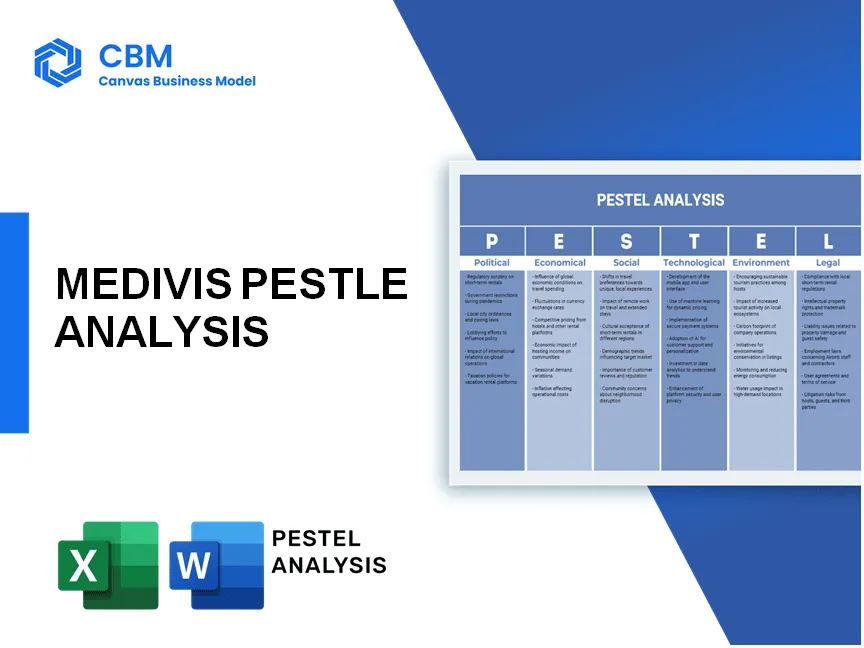In the rapidly evolving landscape of healthcare, Medivis stands at the intersection of augmented reality and artificial intelligence, paving the way for revolutionary advancements in surgical care. Understanding the myriad factors that shape this thriving medical technology company is essential, and a PESTLE analysis reveals the intricate web of political, economic, sociological, technological, legal, and environmental influences at play. Discover how these elements interact, propelling Medivis into the future of surgery and enhancing patient outcomes.
PESTLE Analysis: Political factors
Regulatory support for healthcare innovation
The political landscape around healthcare technology has shown increasing support for innovation. The FDA has streamlined processes under the Digital Health Innovation Action Plan, designed to promote the development and availability of digital health technologies. In FY 2020, the FDA approved over 300 digital health-related projects, demonstrating a robust commitment to enable accelerated pathways for medical devices.
Government funding for medical technology research
In 2021, the National Institutes of Health (NIH) allocated approximately $45.7 billion, with a notable increase in funding directed towards medical technology breakthroughs. The budget for the National Institute of Biomedical Imaging and Bioengineering (NIBIB), which funds advanced imaging technologies, was around $405 million in 2021, emphasizing governmental dedication to fund research that could benefit companies like Medivis.
Policies incentivizing the use of AI in healthcare
In 2020, the U.S. Department of Health and Human Services initiated several policies aimed at boosting AI integration, including the establishment of the AI in Health Care Task Force that focuses on overcoming barriers to AI adoption. Investments in AI for healthcare are projected to reach $6.6 billion by 2025, reflecting substantial governmental interest in fostering an environment conducive to technological advancements.
Healthcare reforms promoting advanced surgical methods
The Affordable Care Act (ACA) and subsequent health reforms have increasingly emphasized value-based care, which incentivizes the adoption of advanced surgical methods. The Centers for Medicare & Medicaid Services (CMS) proposed $1.9 trillion in savings from improved surgical methods over ten years, which could benefit companies investing in augmented reality and artificial intelligence solutions.
Collaboration with regulatory bodies for compliance
Medivis, like many medical technology companies, is subject to stringent regulations. The FDA's 2021 budget included $3.4 billion dedicated to medical product safety, indicating the importance of collaboration between companies and regulatory bodies is fundamental for compliance and market approval processes.
| Factor | Year | Amount ($) | Source |
|---|---|---|---|
| FDA Digital Health Approvals | 2020 | 300 projects | FDA |
| NIH total allocation | 2021 | 45.7 billion | NIH |
| NIBIB budget | 2021 | 405 million | NIH |
| Projected AI investment | 2025 | 6.6 billion | Statista |
| CMS proposed savings | 2022 | 1.9 trillion | CMS |
| FDA budget for medical product safety | 2021 | 3.4 billion | FDA |
[cbm_pestel_top]
PESTLE Analysis: Economic factors
Growing demand for efficient surgical procedures
The global surgical robotics market is projected to reach approximately $12.73 billion by 2026, growing at a CAGR of 22.5% from 2021 to 2026. The increasing prevalence of chronic diseases necessitates more efficient surgical procedures.
Increasing healthcare expenditures globally
According to the World Health Organization, global health expenditure reached $8.3 trillion in 2020, reflecting an increase of 9% from the previous year. In the United States, healthcare expenditure is projected to reach $6.2 trillion by 2028, accounting for nearly 20% of GDP.
Economic downturns affecting budget allocations for hospitals
The financial impact of the COVID-19 pandemic has resulted in a collective loss of about $320 billion in revenue for U.S. hospitals and health systems. These economic downturns have led to a reduction in hospital budgets, affecting investments in technology, including augmented reality and artificial intelligence solutions.
Investment opportunities in health tech startups
In 2021, health tech startups attracted approximately $29.1 billion in global funding, up 67% from 2020. Key investors in this sector are recognizing the transformative potential of technologies in enhancing surgical care.
Cost-saving potentials with augmented reality solutions
The integration of augmented reality in surgical procedures has been shown to reduce operating room costs by 20-40%. Furthermore, augmented reality can decrease procedural time by up to 30%, thereby maximizing efficiency while minimizing resource allocation.
| Economic Factor | Statistics/Financial Data | Impact |
|---|---|---|
| Global surgical robotics market | $12.73 billion by 2026 (CAGR: 22.5%) | Higher demand for efficient surgeries |
| Global health expenditure (2020) | $8.3 trillion | Increased investment in healthcare technology |
| U.S. hospital revenue loss (COVID-19) | $320 billion | Reduced budgets for technology investments |
| Investment in health tech startups (2021) | $29.1 billion | Growing opportunities in healthcare technology |
| Cost-saving with AR solutions | 20-40% reduction in operating costs | Increased efficiency, reduced resource use |
PESTLE Analysis: Social factors
Rising consumer awareness of advanced medical technologies
The growing accessibility of information through the internet has dramatically increased consumer awareness of advanced medical technologies. According to a 2021 survey by the Pew Research Center, approximately 77% of American adults reported having researched medical treatments or procedures online. This highlights the trend towards informed patient participation in healthcare decisions.
Changing patient expectations for minimally invasive procedures
Patients are increasingly preferring minimally invasive surgical options. A report from the Market Research Future in 2020 estimated that the global minimally invasive surgery market will grow to USD 36.2 billion by 2023, up from USD 27 billion in 2019. This shift reflects broader expectations influenced by the benefits of reduced recovery times and lower risks of complications.
Acceptance of AI and AR in medical practice
According to a 2022 Statista survey, approximately 63% of hospital executives in the U.S. reported they are currently using or planning to implement AI technologies in their operations. In addition, a report by MarketsandMarkets projected the augmented reality in healthcare market to reach USD 2.4 billion by 2026, increasing at a CAGR of 26.1% from 2021 to 2026.
Demographic shifts leading to higher surgical needs
As populations age, the demand for surgical procedures increases. The World Health Organization (WHO) reported in 2019 that the number of people aged 60 years and older is expected to reach 2.1 billion by 2050. Furthermore, a study published in JAMA Surgery indicated that older adults accounted for 34% of elective surgical procedures in the U.S. as of 2020.
Increased importance of patient-centered care
There has been a rising trend towards patient-centered care, focusing on patient preferences and values in healthcare delivery. A report by the Institute for Healthcare Improvement indicated that medical practices that integrate patient-centered approaches see an increase in patient satisfaction scores by as much as 20%. Moreover, CMS (Centers for Medicare & Medicaid Services) found that hospitals with high patient-centered care ratings could realize improved reimbursements of up to 1.5% to 2% in their overall revenues.
| Social Factor | Statistic/Data | Source |
|---|---|---|
| Informed Patient Participation | 77% of American adults researched medical treatments online | Pew Research Center 2021 |
| Minimally Invasive Surgery Market Size | USD 36.2 billion by 2023 | Market Research Future 2020 |
| AI Technology Usage by Hospitals | 63% of executives reported using or planning AI technologies | Statista 2022 |
| Augmented Reality Market Growth | USD 2.4 billion by 2026 | MarketsandMarkets |
| Population Aged 60 and Older | 2.1 billion by 2050 | World Health Organization |
| Elective Surgery in Older Adults | 34% of elective surgical procedures | JAMA Surgery 2020 |
| Patient-Centered Care Satisfaction Increase | Up to 20% increase in patient satisfaction scores | Institute for Healthcare Improvement |
| CMS Reimbursement Increase | 1.5% to 2% improvement in revenues | Centers for Medicare & Medicaid Services |
PESTLE Analysis: Technological factors
Innovations in augmented reality applications
According to a 2021 report by MarketsandMarkets, the augmented reality in healthcare market was valued at approximately $1.32 billion and is projected to reach $11.14 billion by 2026, growing at a CAGR of 54.4%. Medivis utilizes augmented reality to enhance surgical visualization, allowing surgeons to overlay digital information onto the physical world.
Advancements in artificial intelligence algorithms
The healthcare AI market was valued at around $6.6 billion in 2021 and is expected to exceed $67.4 billion by 2027, reflecting a CAGR of approximately 44.9%, as reported by Mordor Intelligence. Innovations in AI enable improved image analysis and decision-making processes in surgical environments, significantly advancing the accuracy of surgical procedures.
Integration of real-time data analytics in surgery
According to a 2020 report by Grand View Research, the global real-time analytics market in healthcare was valued at approximately $12.2 billion and is expected to grow at a CAGR of 23.6% from 2021 to 2028. Real-time data analytics facilitate immediate access to patient data during surgery, enhancing operational efficiency and patient safety.
Development of user-friendly interfaces for surgeons
Research indicates that user experience directly impacts surgical performance. A study published in the Journal of Healthcare Informatics Research highlights that implementing user-friendly interfaces can reduce training time for surgical staff by 30-50%. Medivis focuses on intuitive design to streamline the user experience for surgeons, improving their interaction with augmented reality tools.
Need for robust cybersecurity measures in tech solutions
As reported by Cybersecurity Ventures, global spending on healthcare cybersecurity is forecasted to reach $125 billion by 2025. Cybersecurity has become a critical concern in the integration of advanced technologies in healthcare, especially with the rise of data breaches impacting medical facilities. Medivis prioritizes implementing advanced security protocols to safeguard sensitive patient information.
| Technology Factor | Market Value (2021) | Projected Market Value (2026/2027) | CAGR |
|---|---|---|---|
| Augmented Reality in Healthcare | $1.32 billion | $11.14 billion | 54.4% |
| Healthcare AI Market | $6.6 billion | $67.4 billion | 44.9% |
| Real-Time Analytics in Healthcare | $12.2 billion | $40.3 billion (2028) | 23.6% |
| Cybersecurity in Healthcare | $125 billion (2025) | N/A | N/A |
PESTLE Analysis: Legal factors
Compliance with medical device regulations
Medivis operates within a highly regulated environment, particularly concerning medical devices. In the United States, the Food and Drug Administration (FDA) oversees compliance standards. As of 2023, the FDA has approved over 80 new medical device products leveraging augmented reality technologies. Companies must also adhere to the European Union's Medical Device Regulation (MDR), which was fully implemented in May 2021, impacting around 500,000 devices globally.
Intellectual property rights protecting innovations
Medivis invests heavily in securing intellectual property rights to protect its innovations. As of 2023, Medivis holds a portfolio of over 75 patents related to augmented reality and AI applications in healthcare. The global medical device patent landscape has seen about 12,000 patents filed annually in recent years, reflecting a competitive environment.
Liability issues regarding AI-assisted surgical decisions
Liability remains a significant concern in AI-assisted surgeries. According to recent legal studies, malpractice claims related to AI usage in surgery have increased by around 30% over the past year. The legal framework around AI in healthcare is still developing, with an estimated 70% of surgical professionals indicating uncertainty regarding liability in AI-assisted decisions.
Data protection laws affecting patient information management
Data protection laws such as HIPAA (Health Insurance Portability and Accountability Act) in the U.S. mandate stringent measures to safeguard patient information. In 2022, HIPAA fines totaled approximately $24 million due to non-compliance issues. Furthermore, the implementation of the General Data Protection Regulation (GDPR) in Europe has exposed entities to fines up to €20 million or 4% of annual global turnover, whichever is higher.
Ethical considerations in AI use in healthcare
Ethical frameworks for the use of AI in healthcare are evolving, with 85% of healthcare organizations reporting a need for ethical guidelines in AI development and deployment. A survey indicated that 65% of healthcare professionals expressed concerns about bias in AI algorithms, which could lead to unequal treatment outcomes. The annual global market for ethical AI frameworks is projected to exceed $3 billion by 2026.
| Aspect | Details |
|---|---|
| FDA approvals | Over 80 new medical device products using AR technologies |
| EU MDR impact | Affects approximately 500,000 devices globally |
| Patent portfolio | Over 75 patents |
| Annual patent filings | Approximately 12,000 patents filed yearly |
| Malpractice claims increase | Up by 30% in AI-related cases |
| Uncertain liability | 70% of surgical professionals are uncertain |
| 2022 HIPAA fines | Approximately $24 million in fines |
| GDPR penalties | Fines up to €20 million or 4% of global turnover |
| Need for ethical AI guidelines | 85% of organizations reported this need |
| Concerns about AI bias | 65% of healthcare professionals expressed concerns |
| Market for ethical AI frameworks | Projected to exceed $3 billion by 2026 |
PESTLE Analysis: Environmental factors
Focus on sustainable practices in medical tech manufacturing
Medivis has committed to sustainable manufacturing practices, targeting a reduction of its carbon footprint by 30% by 2025. The company utilizes energy-efficient technologies that have reportedly saved approximately 20% in energy costs across its facilities.
Eco-friendly disposal methods for medical devices
Medivis has implemented a program that ensures 90% of its used medical devices are disposed of through eco-friendly means, including recycling and repurposing. The estimated cost savings from these methods equate to $500,000 annually.
Impact of technology on reducing resource waste in surgery
Through the integration of augmented reality in surgical procedures, Medivis claims to have contributed to a 15% reduction in resource waste in operating rooms. A study indicated that AR utilization could lead to a potential savings of $1.2 million per surgical center annually.
Compliance with environmental regulations in production
Medivis meets or exceeds all Federal and State environmental regulations, spending around $400,000 annually to maintain compliance and exceed regulatory requirements. This includes waste management, emissions controls, and sustainable sourcing of materials.
Corporate social responsibility initiatives in healthcare communities
Medivis invests approximately $2 million yearly in corporate social responsibility initiatives focused on healthcare access and environmental sustainability. Their programs include partnerships with local hospitals aimed at promoting eco-friendly practices in patient care.
| Initiative | Investment ($) | Impact | Year Implemented |
|---|---|---|---|
| Sustainable Manufacturing | 500,000 | 30% carbon footprint reduction target | 2021 |
| Eco-friendly Device Disposal | 500,000 | 90% eco-friendly waste disposal | 2020 |
| AR in Surgery | 1,200,000 | 15% reduction in resource waste | 2019 |
| Compliance Investments | 400,000 | Exceeding environmental regulations | 2022 |
| CSR Initiatives | 2,000,000 | Improved healthcare access | 2020 |
In summary, MEDIVIS stands at the forefront of a rapidly evolving landscape shaped by various political, economic, sociological, technological, legal, and environmental factors that together influence the future of surgical care. By harnessing the power of augmented reality and artificial intelligence, they not only respond to the growing demand for innovative medical solutions but also actively contribute to a paradigm shift towards more efficient and patient-centered approaches in healthcare. Navigating this multifaceted terrain requires adaptability and foresight, positioning MEDIVIS to lead the charge in transforming surgical landscapes globally.
[cbm_pestel_bottom]












